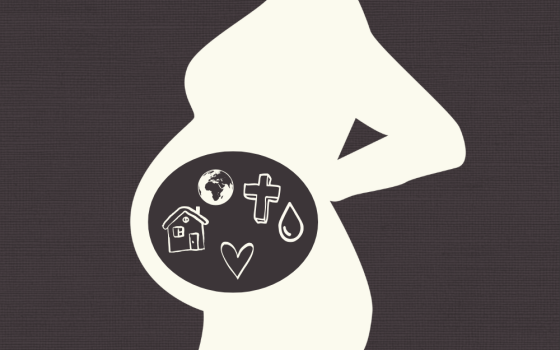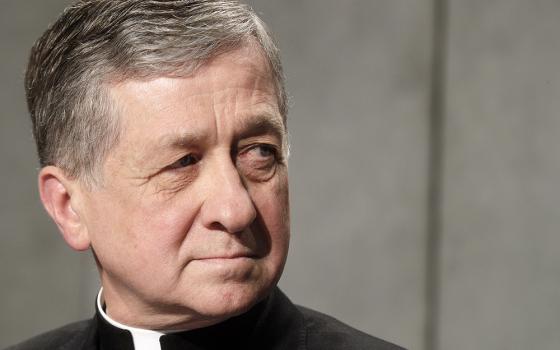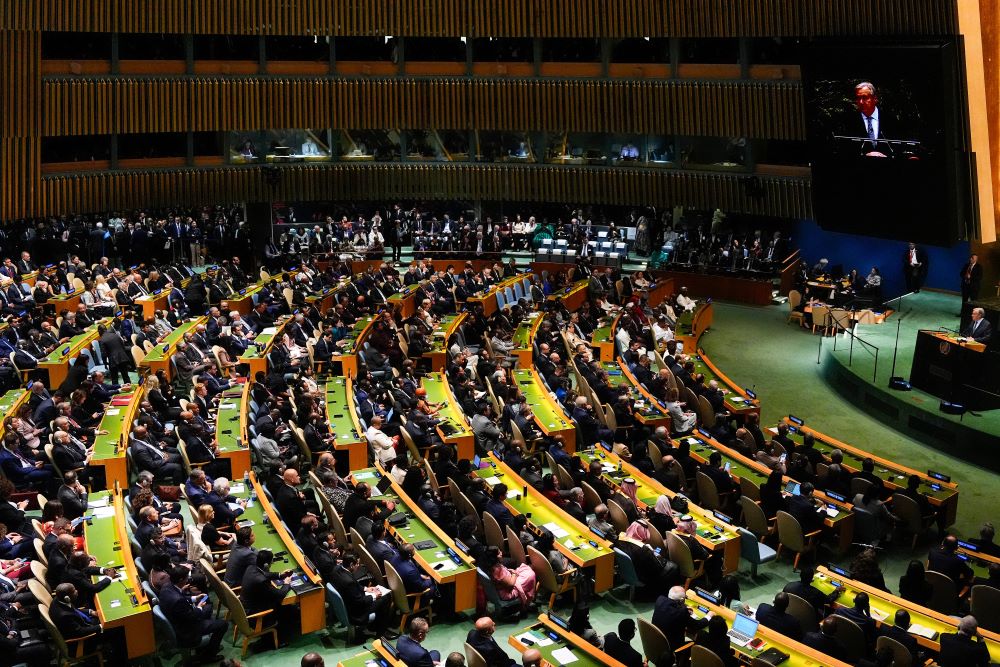
Secretary-General António Guterres speaks during the 80th session of the United Nations General Assembly Sept. 23 at U.N. headquarters in New York City. (AP/Yuki Iwamura)
By definition, the United Nations is a global space.
For the Catholic sisters whose ministries have taken them to the U.N.'s headquarters in New York City, it is also a "Gospel space" — a place where advocating for justice has been welcomed, and where Catholic sisters have found a forum where they can raise issues, lobby diplomats, and present and host testimonies of those "on the ground."
"As a Catholic sister, I see advocacy as the moral responsibility to raise a prophetic voice where silence might perpetuate injustice," said Sr. Ngozi Frances Uti, a member of the Congregation of the Handmaids of the Holy Child Jesus.
Uti, who heads the Centre for Women Studies and Intervention in Abuja, Nigeria, has been a frequent attendee of U.N. events, including this year's Commission on the Status of Women. She views U.N. advocacy "not only as influencing global policy, but also as building legitimacy and moral authority that can be translated into my ministry on the ground."
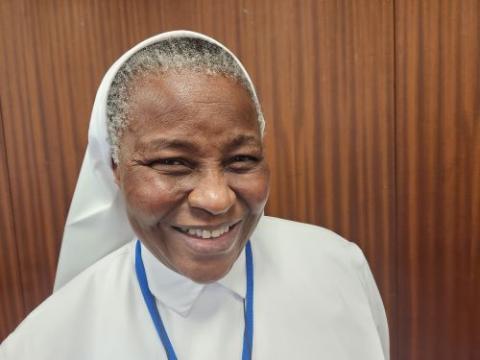
Sr. Ngozi Frances Uti, a member of the Congregation of the Handmaids of the Holy Child Jesus heads the Centre for Women Studies and Intervention in Abuja, Nigeria. (GSR photo/Chris Herlinger)
But as the U.N.'s General Assembly begins its work this week, Sept. 22-26, and as the United Nations celebrates the 80th anniversary of its founding, Catholic sisters who represent their congregations are facing new challenges and a new landscape.
Some of the challenges are due to the changes in religious life itself. With the aging of many congregations, more congregations are sending laity to represent them — though there is still a strong contingent of 15 sisters currently representing their congregations at the U.N. Seven religious nongovernmental organizations, or NGOs, at the U.N. represent sisters or a combination of sisters, brothers and priests have a lay person designated as their main U.N. representative.
That does not mean the congregations are any less committed to the work of advocating for issues they think are important, say both sisters and lay representatives. But it does represent something of a shift. The challenge in finding a sister to head a prominent sister-based advocacy group, UNANIMA International, was one reason UNANIMA decided earlier this year to complete its ministry.
That wasn't the only reason: Some of UNANIMA's 23 members, faced with tighter budgets, decided their priority should be supporting direct ministries of their own congregations in the Global South rather than support work at the U.N.
'We live with the people, and it's important for us to be an advocate for them [and] … to advocate for those who can't speak at the U.N.'
—Sr. Janet Palafox
But equally challenging at the moment is the U.N. itself: an often hard-to-navigate and unwieldy behemoth of agencies, secretariats and councils laden with their own "insider" language and jargon, and which is becoming more confounding because of current global dynamics.
Pope Leo XIV recently said of the U.N. that "it seems to be generally recognized that the United Nations, at least at this moment in time, has lost its ability to bring people together on multilateral issues," adding that there are "obstacles in the way on different levels for the multilateral things to proceed."
In interviews with Global Sisters Report, a number of sisters and lay representatives with ministries at the U.N. have said that the spirit of multilateralism — where U.N.-member states engage with each other in common cause — has diminished, particularly with what they say is the global rise of more authoritarian governments.
And they say the space for "civil society" — non-state organizations — is shrinking with more participation from the private sector, often elbowing out groups like human rights organizations and sister congregations who are interested in holding "governments and powerful people to account," said Sr. Janet Palafox, the NGO representative to the U.N. for the Institute of the Blessed Virgin Mary-Loreto Generalate.
Governments, she said, "do not like that, especially those who want the unjust status quo to continue."
Visibility for women and girls
Even so, sisters remain passionate about the U.N's possibilities.
Uti, for example, believes the U.N. provides "a bridge between the voices of local communities and the global frameworks that guide nations, ensuring that the struggles of ordinary women and girls are given visibility in the highest decision-making spaces of the world."
To do that means entering an arena "where you bring the weighty issues of the world as experienced by particular congregations to the attention of policy makers," said Sr. Winifred Doherty, who served as the U.N. representative of the Congregation of Our Lady of Charity of the Good Shepherd 2008-2024.
"It's leveraging our expertise, coming from our charisms, and entering the diplomatic spaces."
Doherty, who is Irish, spoke in 2017 before the U.N. General Assembly on the issue of human trafficking. While that was a highlight for her ministry, most of her time at the U.N. was spent in unsung behind-the-scenes work typical for the Catholic sisters there — a ministry of long hours that does not get the splashy attention as when world leaders use the U.N. General Assembly Hall as a backdrop to promote their country's accomplishments and progress.
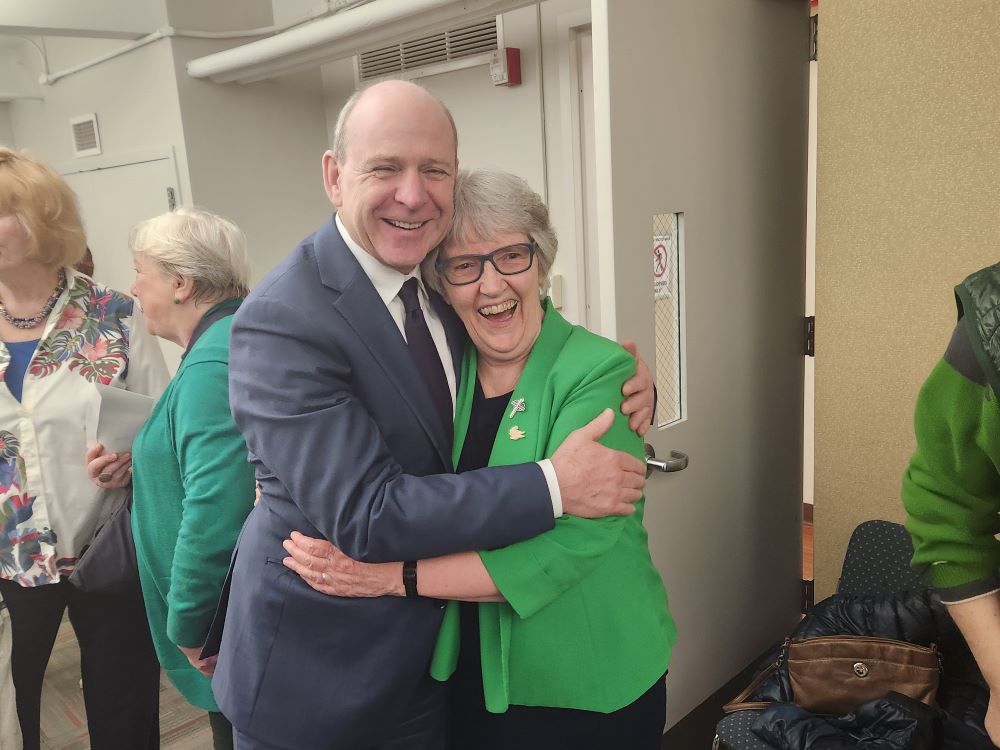
Sr. Winifred Doherty, right, served as the U.N. representative of the Congregation of Our Lady of Charity of the Good Shepherd 2008-2024. Here she is greeted by Fergal Mythen, the current ambassador and permanent representative of Ireland to the U.N., at Doherty's retirement party in April 2024. (GSR photo/Chris Herlinger)
Some in the diplomatic corps appreciate that and say they value the work of Catholic sisters.
Fergal Mythen is the current ambassador and permanent representative of Ireland to the U.N. and spoke at Doherty's retirement party in April 2024. He told GSR that Catholic sisters at the United Nations "have used their voices very effectively at the U.N. to advocate for women and children all over the world, including through their work on the NGO Committee on Social Development and the NGO Working Group to End Homelessness."
"Their unique perspectives and experiences," he said, "have informed the work of U.N.-member states and entities on the topics of homelessness, migration, trafficking and climate change."
The sisters themselves say that their advocacy ministries at the United Nations are valuable in part because U.N. initiatives deserve support at a critical time, like the 2030 agenda to promote the U.N.'s ambitious sustainable development goals, known as the SDGs.
In fact, the passion for the SDGs — which seek to end such challenges as global poverty — is often what animates sisters' ministries marked by long days of meetings; chairing advisory groups; meeting with ambassadors and members of diplomatic missions to press a cause; and working together in alliances with other sisters on related issues.
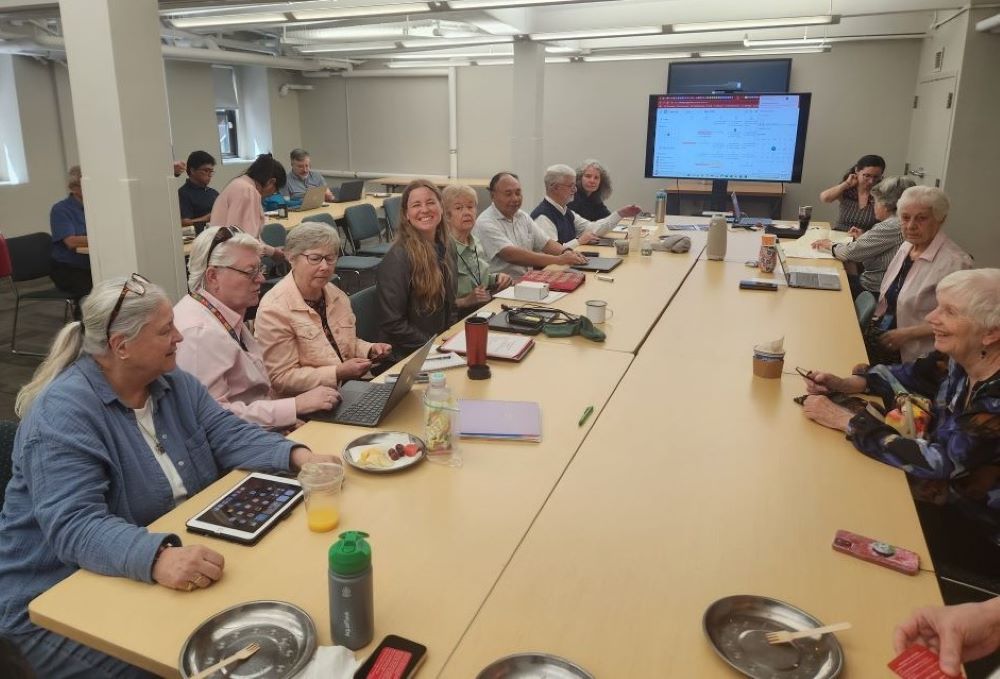
Catholic sisters at the United Nations meet in May at their monthly fellowship-and-support group with other religious, both men and women, called Religious at the U.N., or RUN. (GSR photo/Chris Herlinger)
The sisters meet monthly as a fellowship-and-support group with other religious, both men and women, called Religious at the U.N. They also work together through an advocacy coalition, also of men and women, known as the Justice Coalition of Religious, or JCoR.
No matter what the forum, Palafox and others said that the work of sisters at the U.N. is to convey to the global body the experiences of those on the ground, with whom sisters work in their ministries.
Speaking of sisters' ministries in often economically and socially challenged locales, she said, "We live with the people, and it's important for us to be an advocate for them." Sometimes that means "being in the place to advocate for those who can't speak at the U.N."
For centuries, sisters were 'doing' the SDGs
Sr. Mary Jane Caspillo, the Medical Mission Sisters representative at the U.N., noted that not only do congregations have "people on the ground," but even before the SDGs, "religious congregations were already 'doing' the SDGs — education, health, rights."
'"Not all involvements are or were perfect, but we have been doing this for centuries, and we are doing this not just as a charity," she said, "but because we believe that this is based on justice and rights of every human being on the planet. So we have the history even before some of the member states became members of the U.N."
Caspillo is not alone. When Teresa Blumenstein, JCoR's coordinator, mentions the particular gifts of sisters, she speaks of "long-term visions beyond lifetimes," a continual sense of mission and the affirmation of human-rights principles that predate the U.N. by centuries.
"Certain segments of the U.N. Charter echo Catholic social teaching and the constitutions of congregations," she said. "In many respects, the ideals of the U.N. are like a secular rendering of the principles of sisters' congregations. In a similar fashion, the U.N.'s sustainable development goals are something of a secular road map to what many sisters would describe as the 'City of God.' "
Such an idealistic view can't hide the fact that the wheels of the U.N. turn slowly: sometimes it can take years to insert a few words important to advocates into a U.N. document approved by the member states.
Sometimes, said Notre Dame de Namur Sr. Isabelle Izika, "we don't have big results. Sometimes we are disappointed."
"We are going from one step to another, from one step to another, and then someday we will reach at some point the better world," said Izika, who represents her congregation at the U.N.
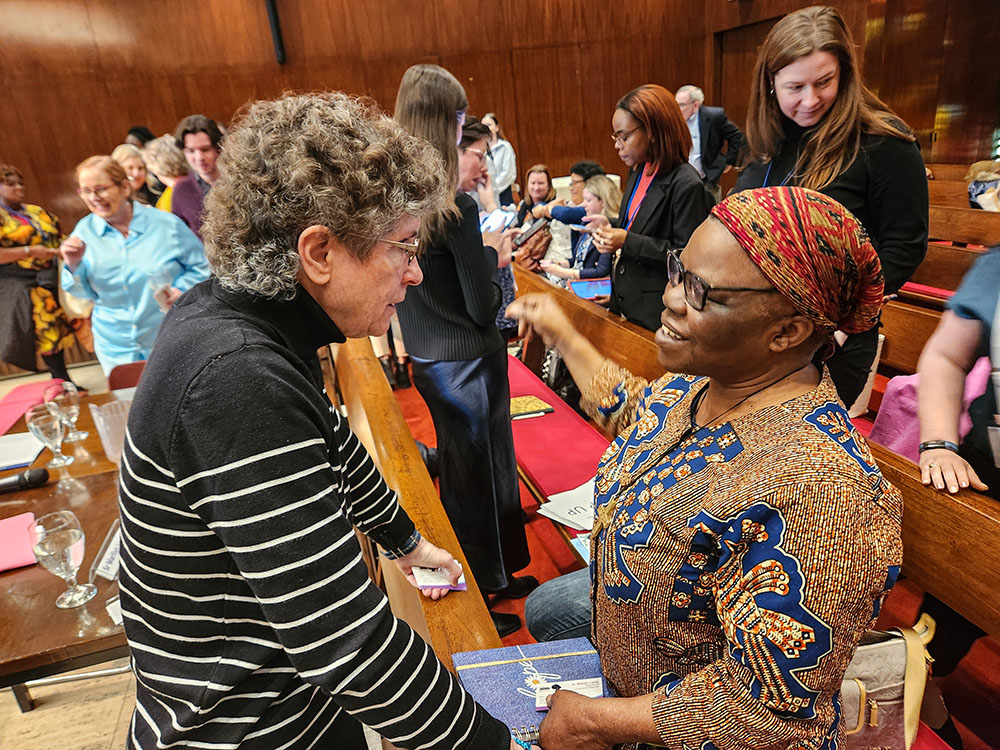
During a March 15 event, "Financing with Dignity," at the Church Center of the United Nations, panelist Mercy Sr. Marilyn Lacey, left, founder and executive director of the international nonprofit Mercy Beyond Borders, speaks to Notre Dame de Namur Sr. Isabelle Izika, right, who represents her order at the U.N. (GSR photo/Chris Herlinger)
That means, she said, getting involved "in very, very difficult processes. But we can't get discouraged. We must always have hope and continue going."
Blumenstein agrees. She said the loss of UNANIMA, for example, will be keenly felt, as it represented "the feminine spirit" of sisters' advocacy at the United Nations. But, she said there is still a critical mass of sister-advocates at the U.N.
The work of JCoR continues, and there remains a quiet but determined spirit among sisters and congregational lay representatives to continue the work they believe needs to be done.
"There are seasons for everything," Blumenstein said. "Things change, but that doesn't mean that things are coming to an end. They aren't."
Soon after Russia began its full-scale invasion of Ukraine in February 2022, members of the U.N.-based advocacy coalition of men and women known as the Justice Coalition of Religious, or JCoR, gathered across from the United Nations for a silent vigil. (Courtesy of JCoR)
"Sisters have always had a strong reputation for 'walking the talk' in terms of living the Gospel values. Our present times, however, call for building upon that tradition by more 'talking the walk,' " she said.
"In other words, we need to publicly tell the stories of injustices incurred by the communities sisters serve as well as lessons learned through sisters' ministries that could benefit other communities and nations."
Blumenstein recalled that soon after Russia began its full-scale invasion of Ukraine in February 2022, JCoR members gathered across from the U.N. building for a silent vigil.
That was a quiet gesture, perhaps. But it spoke of presence, the need to witness and, in a small way, Blumenstein said, of "talking the walk."
Advertisement




